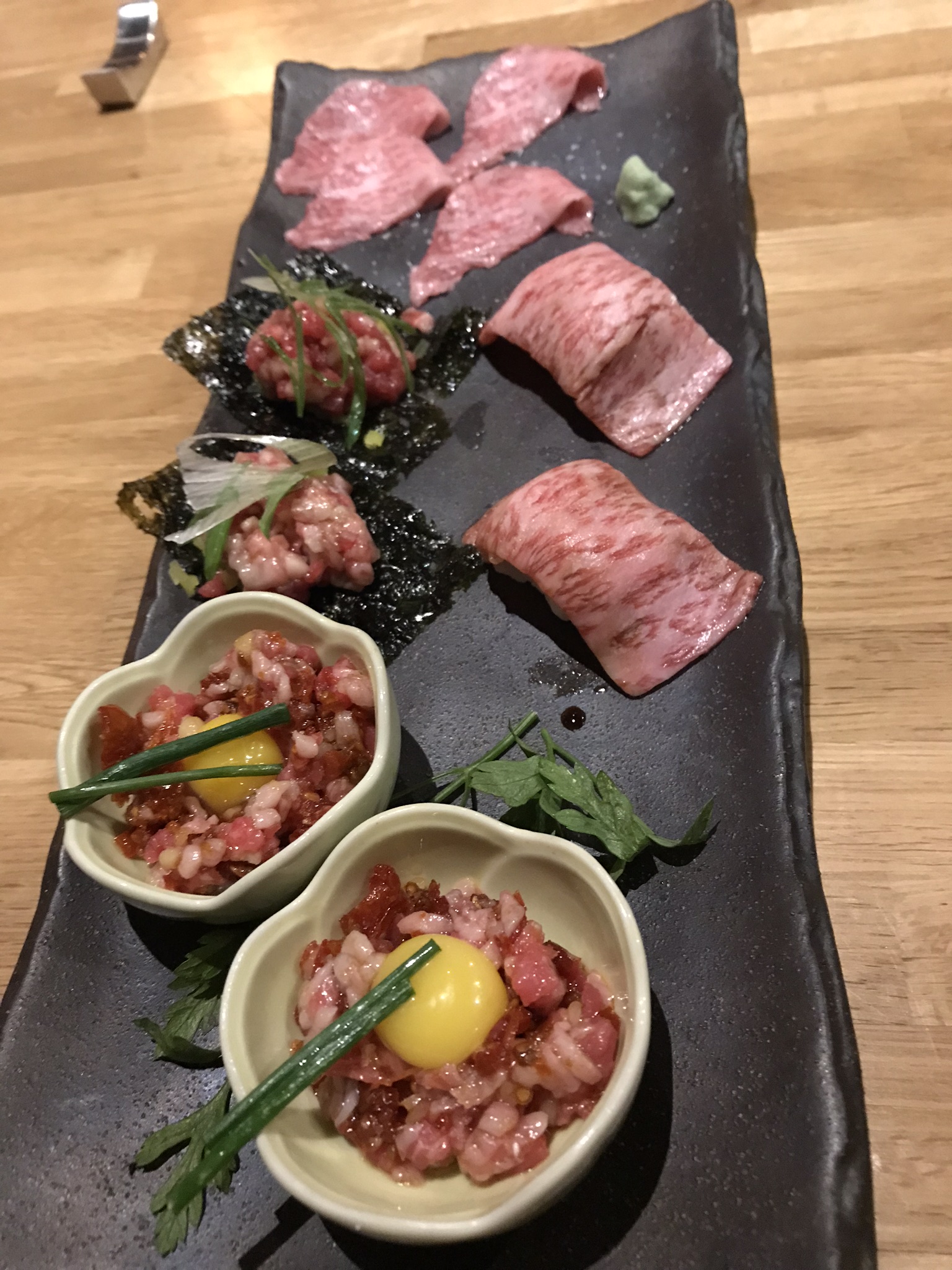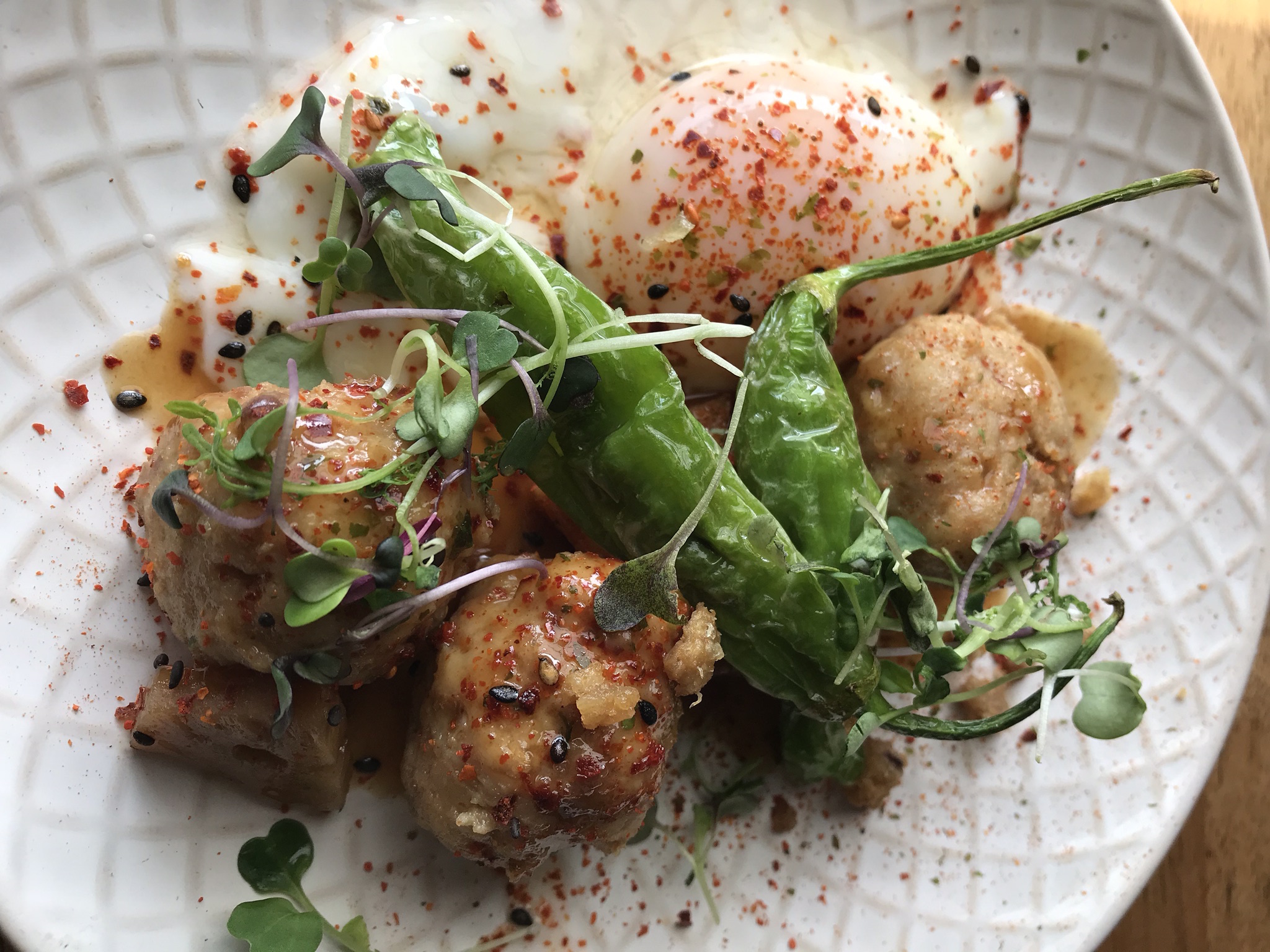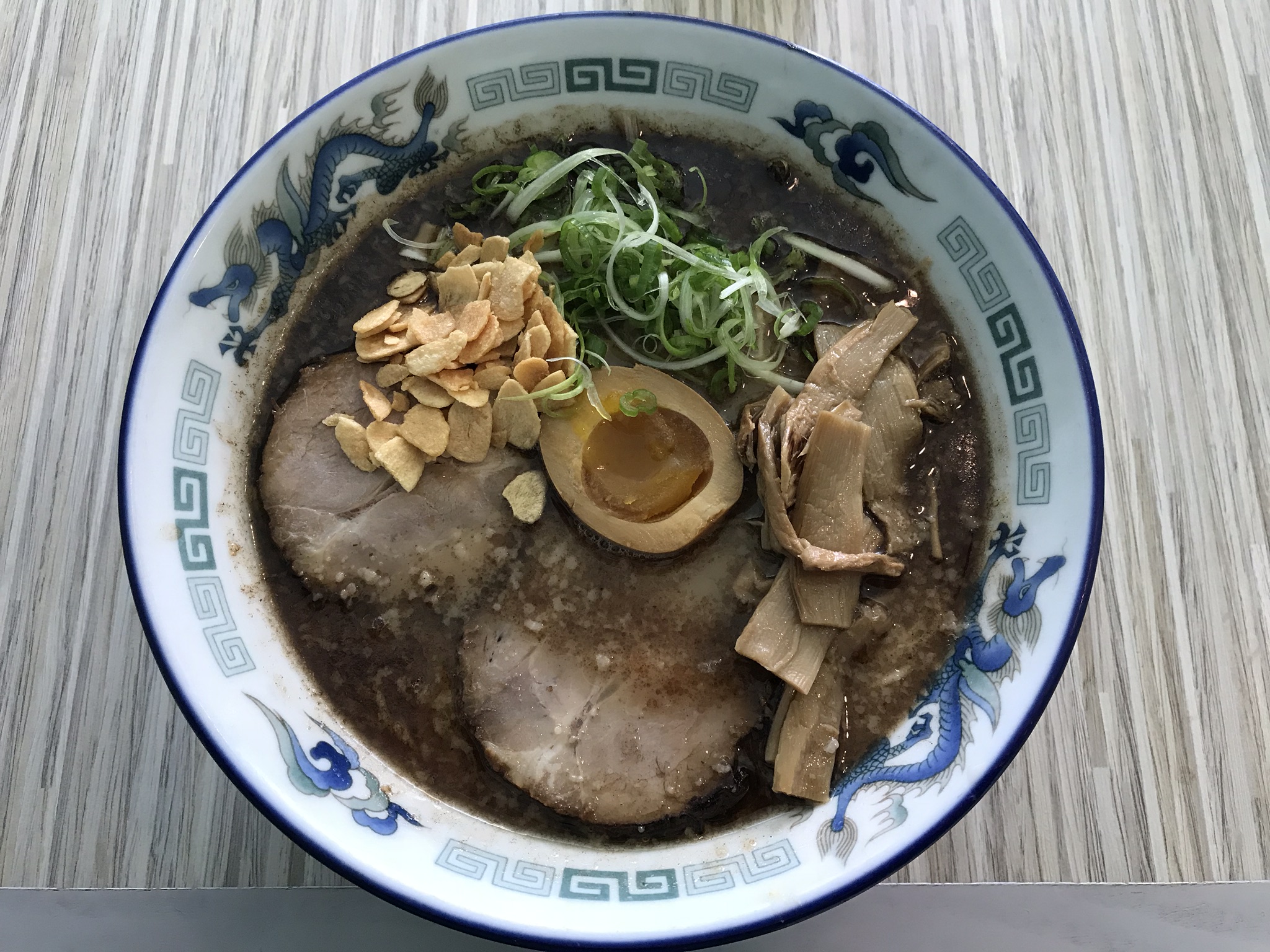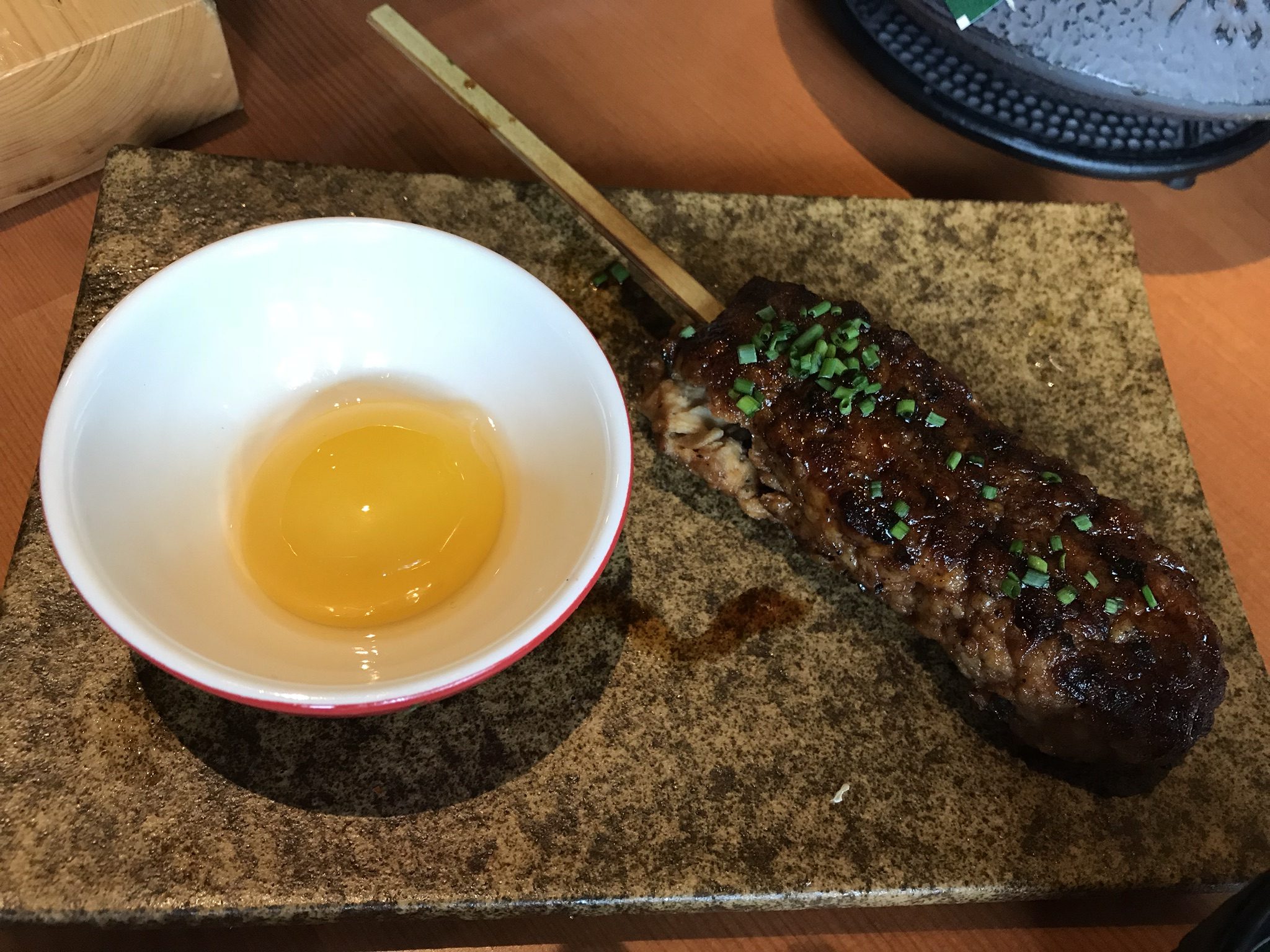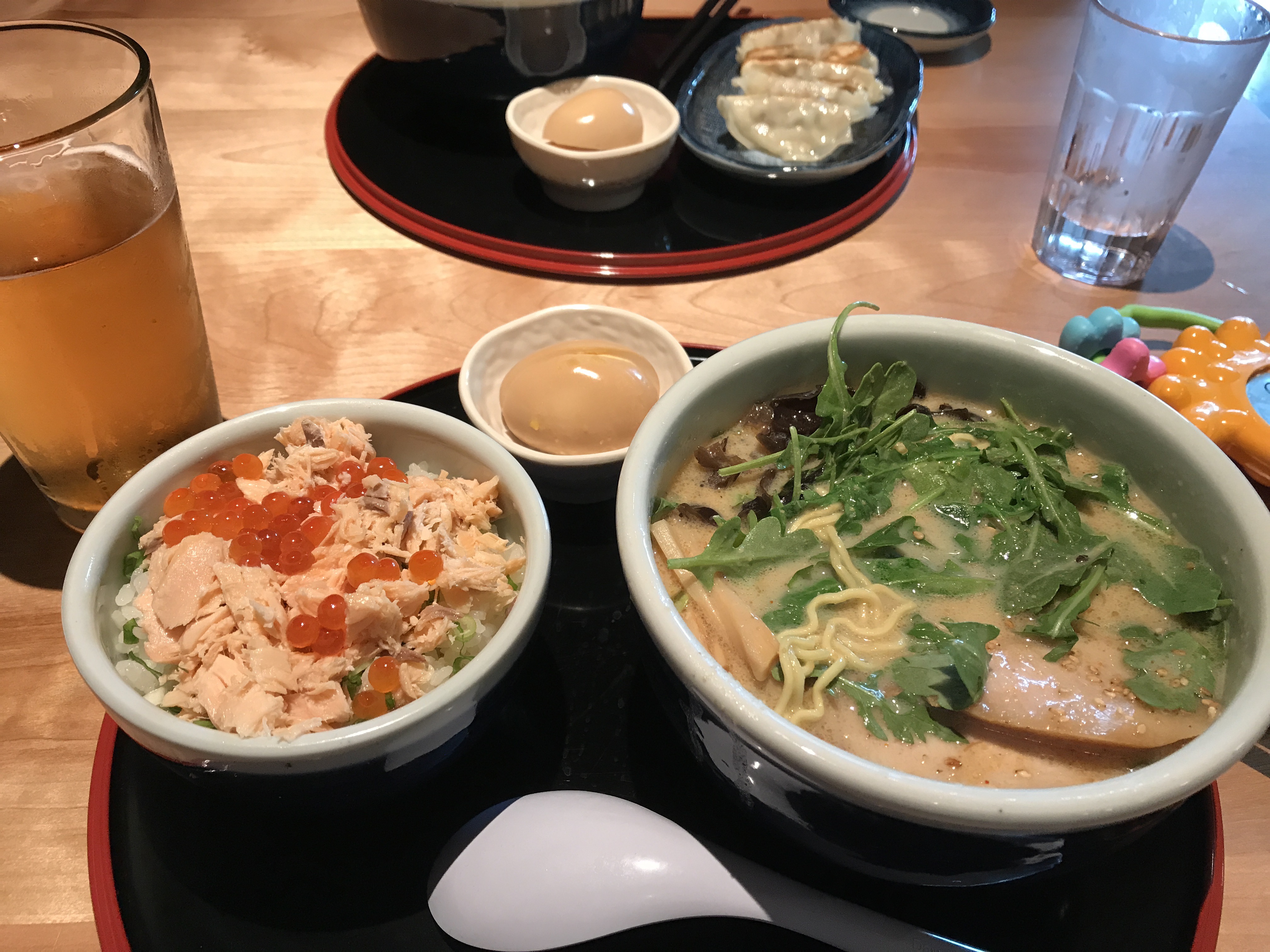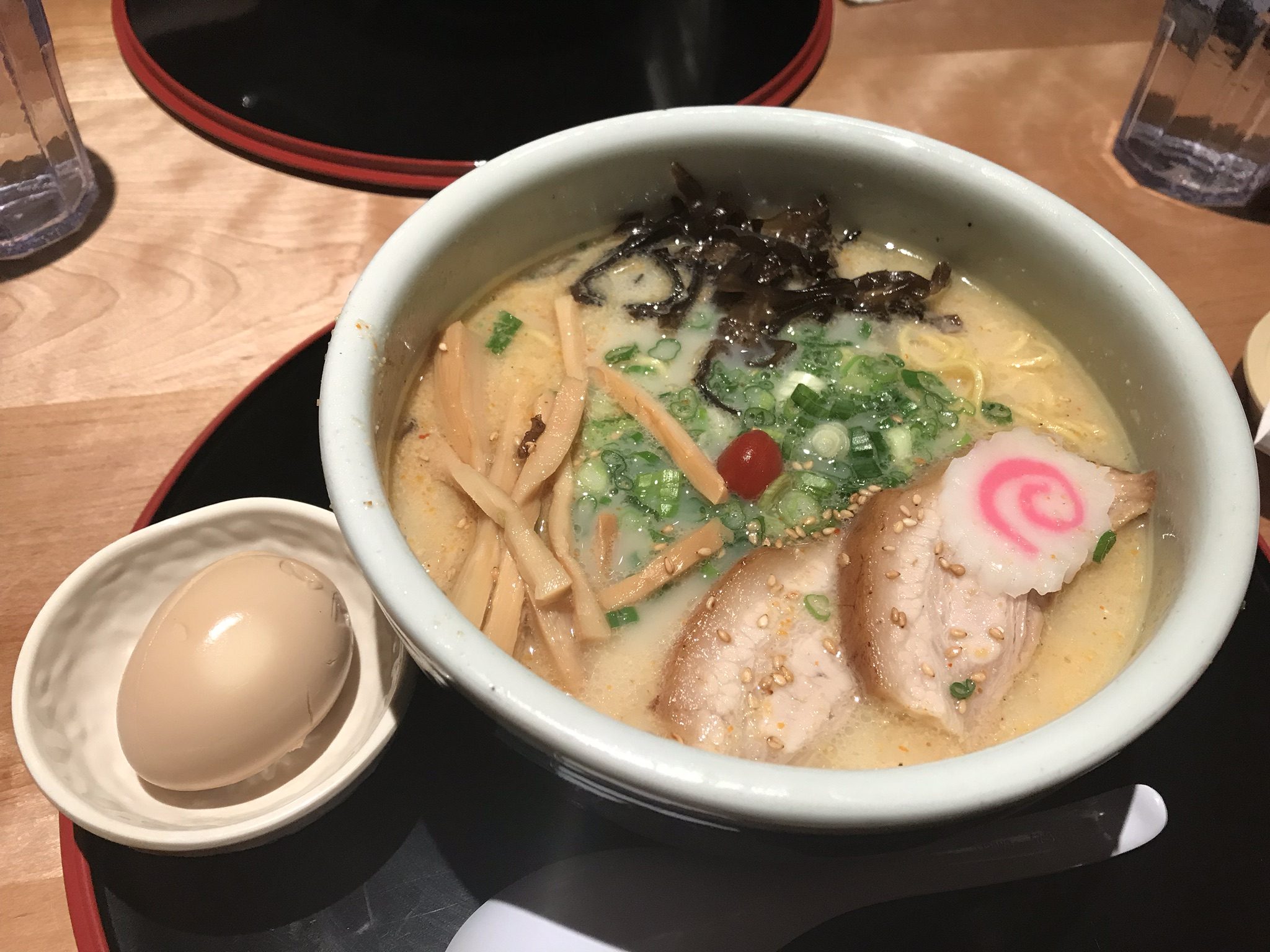this is a page for
Browsing Tag: Japanese Food
Kokkaku
Recommended by: The hostess at Kamonegi mentioned Kokkaku in Miyabi 45th former location, as having interesting presentations on Wagyu beef and staying within the Japanese food theme.

Description on the Kokkaku website: Kokkaku, a “Japanese inspired Meat House” where whole beast butchery is the focus and local sourcing of farmed, foraged, and artisan craftsmanship is at the forefront of interpretation and creativity.
Neighborhood/Type: Wallingford
Address: 2208 N 45th Street, Seattle, WA 98103
What we ate/drank: Wagyu Four Ways-A5 Wagyu sashimi and sushi, and two American Wagyu tartar, one with quail egg and one with nori. Ton Katsu, Lan Roc Pork Tenderloin, Wagyu Bolognese Linguine, 2 Asahi beers, Shoyu Ice Cream
Comments: As mentioned in our Kamonegi review , my wife and I were always big fans of Miyabi 45th. Well, the ex-chef/owner of Miyabi 45th opened up Kamonegi, but whatever became of the space that Miyabi 45 used to be in on the main street of Wallingford neighborhood on 45th Street? We actually had no idea, but the hostess at Kamonegi suggested it as another Japanese restaurant to visit and mentioned they had unique presentations on Wagyu beef.

So what is Wagyu? It’s basically four types of Japanese beef cattle breeds, the most famous being Kobe beef. So what makes Wagyu beef so special? The main difference is that Wagyu beef is highly marbled, which means it’s highly fatty and leads to a better taste and a buttery flavor. The Japanese have taken developing Wagyu cattle to a whole new level through distinct breeding methods, special feeds and longer periods of fattening the cattle.

Let’s first talk about the restaurant. As you enter on 45th Street, you’ll notice their herb garden as you enter the front door. There are two tables near the window, which is where we were seated. Like most of the places in Wallingford on 45th Street, the space is long and narrow, so besides the two tables near the window, the rest of restaurant is pretty dark. It’s a little too dark for my liking, but it does set a low key romantic ambiance for a perfect date night. Soft instrumental jazz playing overhead also adds to the romantic ambiance. I wouldn’t call the type of décor here minimalist, but it is very simple. On one side of the wall are white hexagonal tile and the opposite side of the wall are plain white walls. The middle portion has two long benches on either side of the wall for larger groups. The rest of the space comprises of a bar that seats maybe 6 people and 5 tables of two.

The staff was very attentive throughout, refilling water, general check ups and explaining the dishes. We didn’t order straight up steaks since we had just been to Daniel’s Broiler the week before, but we did order two dishes with Wagyu meat. First the Wagyu Four Ways, which is served as sashimi, sushi, steak tartare on nori and steak tartare with a quail egg. The Wagyu of course melts in your mouth and all four were delicious, but I’m a sucker for steak tartare and I’m an even bigger sucker for anything served with a raw quail egg, so that was my favorite of the four preparations.



The second Wagyu dish we ordered was the Bolognese Linguine. This was also a super tasty dish, although I don’t know if the Wagyu really added to this dish. The sauce and cheese are what really make this dish.

The other entrée we got was the Pork Tenderloin Ton Katsu. Normally, traditional tonkatsu is a slender piece of pork and here they replace it with a thicker pork tenderloin. I always have issues keeping pork tenderloin moist whenever I attempt to make it at home, but this dish is a homerun. So damn tender and moist! They provide a mortar and pestle to ground up sesame seeds and then you can put the ground seeds on the tonkatsu and pour the sauce over it or combine the seeds with the sauce and use it for dipping, which is what we chose to do. We also ordered a bowl of rice to eat with the tonkatsu, but they also provide a huge mound of shredded cabbage with citrus. We washed these down with a couple of Asahi draft beers.


Ton Katsu, Lan Roc Pork TenderloinWe were definitely stuffed and don’t normally order dessert, but when our waiter explained the desserts they had, one caught our attention. It was the Shoyu(soy sauce) Ice Cream that is made in house. We were so curious we had to order it. Surprisingly, it was quite good. It tasted like salted caramel, but based on the after taste you could tell it was shoyu. You can take a look at the pictures of all these dishes and see how the presentation was flawless. As far as bang for your buck, I would say the dishes we got were fairly priced when taking into consideration the portion size, the presentation and the yumminess.

It’s always good to try different things on the menu whenever you do a repeat visit to get a variety of dishes, but we enjoyed these particular appetizer and entrees so much, I fear we’ll just order the same exact dishes on every visit to Kokkaku.
Ratings:
Atmosphere: 4.00
Service: 5+
Food/Drinks: 4.75
Bang for the Buck: 4.50
Overall: 4.60
Locals Only Factor: “Locals Only” grading-We’ll assign a grading as to how “local” a place is.
-
- Well known or Touristy. Most locals don’t go there unless they have business dinners or visitors in town.
- Most locals know about it
- Locals “in the know” know about it
- Only those who live close by know about it.
- You’re in on the secret. Don’t tell anybody!
Servers Local reader recommendations to visit in the future: After a reader read our post about Kokkaku they suggested another upscale Japanese restaurant, Tamari Bar. Took us a year to get out there, but we finally tried it.
Related Articles:
Arashi Ramen

Recommended by: Nobody. Arashi Ramen was a participant in our Battle of Seattle Ramen post.
Description on Arashi Ramen’s website: The essence of ramen is in the soup, out signature Tonkatsu(pork bone) soup is handcrafted by master chef Daisuke Ueda with premium ingredients simmered over 16 hours.
Neighborhood: Ballard
Address: 5401 20th Ave NW, Seattle WA 98107
What we ate/drank: Black Garlic Ramen(Salt based, pork belly chashu, seasoned egg, bean sprouts, green onion, fried onion, black garlic oil), Arashi Ramen(Salt based, 3 pork belly chashu, seaweed, seasoned egg, beansprouts, green onion, Honey Garlic Kaarage(Japanese fried chicken with our special honey garlic sauce), Spicy Miso Tonkotsu Ramen, Asahi Dry Beer

Comments: Arashi Ramen first started out in Tukwila and opened a branch in Ballard in March of 2016. Since then, we’ve come to Arashi Ramen whenever we have a ramen hankering and in the Ballard area. Just a warning, if it’s crowded, it’ll be difficult to get a table for a party of more than 4. There are only 6 stools along the front window counter. There’s also 6 solo wooden stools along a narrow counter. There’s also a long wooden bench with individual tables that can be pushed together for parties of more than 2, but you’ll have to wait for two of these tables to open up simultaneously. Most of the tables are accompanied by traditional small wooden stools that some might find uncomfortable, but were fine for us.



Arashi Ramen specializes in Tokotsu style ramen, which is known for boiling and simmering pork marrow or pork bones for long amounts of time anywhere from 12-16 hours. This typically leads to a cloudy flavorful broth. Arashi Ramen has the three basic broths of Shio, Shoyu and Miso, but also have variations such as Tantan, Arashi Ramen(appears to be Shio Ramen with more pork belly chashu) and Black Garlic Ramen.
We started with the honey garlic kaarage, which can be hit or miss if not cooked correctly, but it was nice and crispy on the outside and moist on the inside as it should be. The Arashi Ramen was a bit on the salty side, but the black garlic ramen was the star here. I was expecting the garlic to be overpowering, but the garlic oil is very subtle and tasty. And I don’t recall seeing this in any other ramen place, but the spoons provided are the abnormally long and the exact angle that allows you to scoop up every drop of soup.



Overall, we like Arashi Ramen. We like the ambiance although the space is on the small side. It’s easy to find parking. The service is quick and most importantly the ramen is very good. We’d rate Arashi Ramen in our top 5 ramen places in Seattle after Hokkaido Ramen Santouka, Ramen Danbo and Kizuki Ramen.

Ratings(Scale 1-5)
Atmosphere: 4.25
Service: 4.75
Food/Drinks: 4.5
Bang for the Buck: 4.5
Overall: 4.5

Locals Only Factor: “Locals Only” grading-We’ll assign a grading as to how “local” a place is.
-
- Well known or Touristy. Most locals don’t go there unless they have business dinners or visitors in town.
- Most locals know about it
- Locals “in the know” know about it
- Only those who live close by know about it.
- You’re in on the secret. Don’t tell anybody!
Eavesdropping Convos:
Server recommendations to visit in the future:
Related:
- What Visitors Think of Seattle – Japan(36 F)
- Hokkaido Ramen Santouka – Best Ramen in Seattle
- Battle of the Seattle Ramen Restaurants
- Fremont Bowl
Kamonegi – Best Soba in Seattle
Recommended by: Friends we went to dinner with at Junkichi Robata Izakaya

Description on the Kamonegi website: Our soba, traditional japanese buckwheat noodles, are made by hand in the nihachi style of 80 percent buckwheat flour and 20 percent all-purpose flour. our restaurant is one of the few in the nation to showcase handmade soba noodles. unless otherwise specified, our soba can be ordered as seiro (cold noodles with warm dipping sauce) or nanban (hot noodles in hot broth, like soup noodles). we also feature bukkake soba dishes with all toppings, noodles, and sauce together in one bowl.
Neighborhood/Type: Fremont
Address: 1054 N 39th Ave, Seattle, WA 98103
What we ate/drank: Creamy morel mushroom and pork belly soba, Yakitori duck tsukune with soft egg, Shrimpcado Bukkake – shrimp tempura, avocado, cucumber, daikon oroshi, wasabi, Anago Tempura -(sea eel), curry salt, lemon

Comments: Update 9/22/19: Kamonegi just made Seattle Met’s 100 Best Restaurant
My wife and I were always big fans of Miyabi 45th. In fact, we had one of our first “getting-dressed-up” dates there. It was the first place, I’d ever laid my eyes on a Yamazaki Whiskey bottle for the first time. So we were heartbroken, when we heard that the chef/owner was stepping away from the restaurant, although it was to care for her daughter, so you can’t begrudge a parent for making that decision.

We were so happy to hear that Chef Mustuko Soma was opening a soba restaurant in the old Art of the Table space. We never had issues getting into Miyabi 45th, so we decided to drop by Kamonegi on a random weekend, but the place was packed. So we tried the following weekend. Same result, it was packed. We soon learned that this Kamonegi became a “hot spot” and had to learn the hard way that you either need to get there super early or make a reservation. We were unaware that Kamonegi had accumulated some accolades over the summer.
- It was named one of the Top 50 New Restaurants in Bon Appetit Magazine in July.
- It was also featured in a New York Times article (along with Analog Coffee), What To Do in Seattle.
- A co-worker of mine also mentioned Kamonegi was featured on a popular TV show in Japan that revolves around Japanese people who move overseas and become successful, so visitors from Japan also want to visit.
We normally decide to eat out on a whim, so it was difficult to really time our visit to Kamonegi without a reservation, but we finally did.


We got there on a Friday at 3:45pm. I suggested to my wife that we just wait in the car and go in right when it opened at 4:00pm. She wasn’t having it and wanted to get to the door early and she was right. As we walked up to the door, there was a line already forming. When the doors opened, there was a total of 15 people in line. The host asked if we had reservations. We didn’t, so the host asked if we can make it quick and get out by 5:00 because she had a reservation for our table. We had to pick up our daughter from daycare by 5:15, so we told her we’d be out by then.


The space is shaped like a triangle which makes the configuration of the restaurant a little odd and cramped. You’ve got the bar area to the right, which seats about 4 people, you have the 5 seat high counter where you can watch the chefs prepare the dishes, there are 3 seats at the middle window and to the left is the main seating area that with a wooden bench and individual tables. This area probably seats around 18 people.
Soba and Tempura are the stars here, but the dish we enjoyed the most was the Yakitori Duck Tsukune w/soft egg. This was taken from the Happy Hour menu. This is normally a $14 dish, but I believe it was $9 during Happy Hour. I love me some egg yolk. Add that with tender duck tsukune meatballs with shishito peppers and you got me licking the plate for every last drop of yolk. The next plate we had was the Anago Tempura. I’ve never had Anago(salt water eel) in this fashion before. The curry salt was a good compliment instead of the usual Tempura dipping sauce. I don’t normally get my soba in the bukkake style(cold noodles and broth), but it was super hot in Seattle the day we went, so ordering the Shrimpcado Bukkake made perfect sense. We also ordered the Morrel Mushroom and Pork Belly Soba Seiro(hot) style. This was also a hit with us. The morrel mushroom really comes through in the dipping sauce and the pork belly is so tender. The hot dipping sauce was really concentrated and flavorful so when it came time to pour in the sobayu(the left over water from cooking the soba noodles that has the expelled nutrients that they give you later in the meal), it turned into the perfect consistency for a soup. This dish really makes me look forward to their Fall/Winter soba dishes.

Creamy morel mushroom and pork belly soba 5/5




We’re definitely interested to come back in the winter to try some of warmer soba dishes with denser soups. We’ll be making reservations in the future, because I don’t think Kamonegi is going to get any less popular.
BTW, “Kamonegi” is Japanese proverb used when a stroke of luck happens. The literal translation is “a duck comes along carrying a leek on its back”. Duck soup is made with duck and leeks, so having the two main ingredients appear at once is a stroke of luck. That explains the duck and leek on their signage.
UPDATE: 3/19/20 -Take out during the COVID-19 Shutdown

Japanese Vegetable Curry-Vegetarian curry, potato, bell pepper, carrot, onion, side of rice w/pork katsu
Ratings:
Atmosphere: 4.75
Service: 5
Food/Drinks: 5
Bang for the Buck: 5 (hand made soba, cmon! If you want a true appreciation of what you’re eating see the video below)
Overall: 4.85
Locals Only Factor: “Locals Only” grading-We’ll assign a grading as to how “local” a place is.
-
- Well known or Touristy. Most locals don’t go there unless they have business dinners or visitors in town.
- Most locals know about it
- Locals “in the know” know about it
- Only those who live close by know about it.
- You’re in on the secret. Don’t tell anybody!
Eavesdropping Convos: None. But here’s a Youtube video of the chef making the soba
Servers recommendations to visit in the future: The hostess at Kamonegi mentioned Kokkaku in Miyabi 45th former location, as having interesting presentations on Wagyu beef and staying within the Japanese food theme.
Related Articles:
Ooink
Recommended by: Brandon from Junkichi Robata Izakaya

Description on Ooink Ramen website: OOINK’s preparation is simple & traditional, with the number one focus always being, “respect the ingredients.” The pig is often the star of the show, but every ingredient that enters the OOINK kitchen is given the chef’s full attention, leaving nothing to waste & no detail overlooked. The preparation is classic in style & one that has been tested & tried over & over; always striving to achieve perfection, a labor of love you can taste in every slurp. So please, sit back… enjoy a drink, let the broth warm you, the flavors comfort you,
& please slurp. No other sound could be a better compliment to the chef & OOINK team.
Neighborhood:Capitol Hill
Address: 1416 Harvard Ave, Seattle, WA
Type: Ramen
Music playing: None
What we ate/drank: Kotteri Ramen(Pork broth, Hawaiian sea salt with pork chasu, bamboo shoots, aji tamago(marinated egg), scallions, garlic chips, black garlic tare
Comments: In our Battle of Seattle Ramen post, Ooink made the field, but didn’t make it past the first round. It’s not that Ooink is not good, it’s just that the influx of really good ramen restaurants the last few years in Seattle, has made the competition fierce.

Ooink is located in Harvard Market, a little shopping center located in Capitol Hill right on Broadway Ave. It’s not exactly the most posh looking place, but for a relaxed informal environment it’ll do. Just a warning, if you plan to come here during a busy lunch or dinner time, don’t come here with more than two people. You might be waiting awhile. There are about 8 small tables that seat two, so parties bigger than that will have to wait for two tables to be moved together. The only other seating options are 3 stools at a high counter by the front on either side of the door. There’s also a small table right next to the cashier. In total, it probably fits 20 people.

You get a menu with an accompanied sheet to mark what meal you want to order and any extras or exclusions. I was told the Kotteri Ramen was the most popular, so that’s what I got. Some callouts:
- Noodles were a bit on al dente side, which is fine.
- I found the egg a bit on the small side.
- The char siu pork is something you don’t normally find in ramen. I’m used to seeing it in Saimin.
- The broth is really flavorful, but not salty.
- I noticed the spoon is smaller than normal ramen spoons.
- They have aprons hanging on the wall that you can put on so you can slurp away without having to worry about hitting up the dry cleaner after your meal. It’s the first time I’ve ever seen that, but it totally makes sense. I wonder why other ramen places don’t do this?
I like ramen places that really focus on the ramen and don’t have a lot of other dishes. Ooink serves only ramen with the exception of a few small dishes-gyoza, mapo tofu + rice and ayam goreng, which is fried chicken. All the other ramens are either traditional(Shio, Shoyu, Kotteri), vegetarian or with a modern twist(Mapo Tofu, Mala w/umami chili tare). They also serve beer and sake.

One thing that Ooink does that I’d like to give them props for. There’s been a trend to include tips or service charge into the price of meals. You can debate about the merits of this all you want(I briefly discuss this here), but when restaurants do this, I appreciate that they highlight it and bring it to your attention. I hate restaurants that have tiny fine print on their menu about the service charge/tip being included, are very discreet about it on their check and then include an additional tip line even when tip is included! I get that people may want to include an additional tip if they received exceptional service, just don’t be shady about it. At Ooink there is no mistaking that the service charge is included because they highlight it on the bill and there’s no line on the bill for tipping. I applaud Ooink for doing business this way.

Ratings:
Atmosphere: 3.75
Service: 5
Food/Drinks: 4.75
Bang for the Buck: 4.25
Overall: 4.50
Locals Only Factor: “Locals Only” grading-We’ll assign a grading as to how “local” a place is.
-
- Well known or Touristy. Most locals don’t go there unless they have business dinners or visitors in town.
- Most locals know about it
- Locals “in the know” know about it
- Only those who live close by know about it.
- You’re in on the secret. Don’t tell anybody!
Eavesdropping Convos:
Related:
**********Unfortunately, This Restaurant Has Closed Down**********
Recommended by: Amy/Emmy? from Hokkaido Ramen Santouka.
Description on the Junkichi Robata Izakaya website: Junkichi Robata Izakaya is an upscale authentic style of Japanese cuisine utilizing a live fire charcoal grill. Dating back centuries to northern Japan where fishermen would gather around a communal hearth for warmth and to prepare their food, fishermen were searching for a way to prepare their meals aboard their vessels and created a way to enclose the charcoal to protect their boats from the high heat and thus robata was created. Originally a method for northern Japanese fishermen to be able to cook aboard their vessels the definition of Robata is a charcoal grill guests can be seated around used to slow cook skewers of the freshest ingredients over hot coals and can literally be translated to “fireside-cooking”.
Neighborhood/Type: Capitol Hill
Address: 224 Broadway East. Seattle, WA 98102
What we ate/drank: ASAZUKE- house made Japanese pickled mixed vegetables, ginger, kombu kelp, shaved red chili pepper, SHISHITO PEPPERS, TORIKARA-deep-fried crispy organic free-range chicken w/original soy sauce flavor, shishito pepper, lemon, YAKI-GAKI-grilled shucked oysters , chives w/homemade soy sauce, BATTERA-vinegar marinated mackerel, shiso leaf, gari ginger, roasted sesame seeds ,whiteboard kelp, seven spice seared tuna, avocado, cucumber, spicy tuna tartar, flying fish roe, serrano pepper, cilantro, bbq sauce, spicy mayo, habanero sauce, tempura crunch, JUNKICHI TSUKUNE- duck & organic free-range chicken, shrimp, jew’s ear fungus, meatloaf Junkichi Style , GINDARA SAIKYO-black cod marinated in sweet saikyo miso, grated daikon radish, vinegared tiny gingerroot
Comments: Robata means “fireside cooking” in Japanese and is basically Japanese barbeque in which fatty meats and vegetables are cooked over coals. The coals used are not the black chunks we put in our normal outdoor barbeque, but compressed wood. Something with fatty content is best for robata because the intense heat creates a tasty crust. The tradition started in Northern Japan where fisherman took lit coals out on to their boats so they could grill food while out to sea. It was difficult to start fires on wooden boats, so bringing lit coals from the mainland to be used for meals was the main option. Izakaya is casual, informal dining with normally small dishes sorta like Japanese tapas.
We went to Junkichi Robata Izakaya for dinner and met up with friends one of which is from Japan. We relied on her to do most of the ordering although our server had really good suggestions and more than able to answer all our questions about preparation, taste profile and how big the servings would be. Being on Capitol Hill and having a more modern feel, I was worried about how authentic the food might be at Junkichi Robata Izakaya, but my friend assured us it’s very authentic preparation with more local ingredients. In the grand scheme of things, authenticity matters less to us than being tasty. You often here people say that Un Bien and Paseo are not authentic Caribbean sandwiches. Who cares?! They damn good!
As mentioned Junkichi Robata Izakaya has a modern feel to it and an open kitchen with various ingredients laid out at the counter near the open prep area. They also have a small patio out front. I’ll admit the food is a little on the higher-priced side, but the food preparation and tastiness of every dish we had was spot on. They also have a wide variety of food so it feels like you can go back over and over and try many different dishes. Having a group and sharing dishes is definitely the way to go.
All the dishes were good, but the one dish I would order over and over again would be the Yaki-Gaki, the grilled oysters. The oysters are monster huge and normally my preference for oysters is raw, but the char from the grill along with the oyster juice left over in the shell is sooo good. See the rest of our ratings down below.








A funny note. As mentioned above the local who recommended Junkichi Robata Izakaya worked at Hokkaido Ramen Santouka. When we walked in to Junkichi we noticed the little robot that is supposed to recognize you if you sign up and have been there before. We said, “That’s the same robot they have at Santouka.” We later discovered that Junkichi Robata Izakaya and Hokkaido Ramen Santouka are owned by the same company! So we wondered whether or not this was a genuine favorite of a local or if she was “trying to keep it in the family”. Regardless, both restaurants are at the top of our favorites list.
Ratings:
Atmosphere: 4.75
Service: 5
Food/Drinks: 5+
Bang for the Buck: 4.25
Overall: 4.75
Locals Only Factor: “Locals Only” grading-We’ll assign a grading as to how “local” a place is.
-
- Well known or Touristy. Most locals don’t go there unless they have business dinners or visitors in town.
- Most locals know about it
- Locals “in the know” know about it
- Only those who live close by know about it.
- You’re in on the secret. Don’t tell anybody!
Eavesdropping Convos: None
Servers recommendations to visit in the future: Brandon suggested Ooink down the street as a favorite.
Bonus recommendations to visit in the future: Our friends we dined with suggested Kamonegi.
Related:
Hokkaido Ramen Santouka
Recommended by: Nobody. Hokkaido Ramen Santouka was the winner of our Battle of Seattle Ramen post.

Description on the Hokkaido Ramen Santouka website: We would like you to try our ramen and enjoy its delicious flavor to the last drop. This is the wish of the founder, part of every small bowl of ramen.
Neighborhood/Type: University Village
Address: 2626 NE Village Ln, Seattle, WA 98105
Music playing: None
What we ate/drank: TONKOTSU MISO RAMEN-Robust miso paste and silky broth, with a hint of bonito dashi creates the gentle balance flavor. TORONIKU GOMA MISO RAMEN-Combination of savory flavors of sesame and miso in creamy tonkotsu broth.Topped with menma, kikurage mushrooms, toroniku slices and baby arugula leaves. TSUKEMEN-Thickened soy flavored tonkotsu soup has enriched flavor and umami. SHIYAKE IKURA GOHAN-Rice bowl topped with grilled salmon & salmon roe. Gyoza.

Comments: Hokkaido Ramen Santouka was the winner of our Battle of Seattle Ramen post. The post also provides a good primer with my own view on Seattle ramen history and how it’s evolved so quickly in the last few years. This location has only been open for a year and located in University Village. Their only other US locations are in Bellevue and two more in Boston. So why do we believe that Santouka is the best ramen in Seattle. Well, we go pretty often and have tried the Shio, Shoyu, Miso and Goma Miso Ramens. We’ve had the Tsukemen, gyoza, takoyaki, karaage and all are top rate. They also have “combos” where you can mix and match ramen dishes with their side dishes. And while many ramen places allow you to order larger portions by paying extra, Santouka is the only place I know of in Seattle that gives you the option to order a smaller portion for a lower price. The capper for us is that they have free ramen for kids all day, every day.

The service is quick and regardless how busy it is, we’ve never had to wait long for a seat. And it’s not a big place to begin with. I’m the type of person who likes certain foods at a certain tempature. I only like hot coffee even if it’s a 100 degrees. I like my water ice cold. There are other foods that I can eat hot or cold like pizza and fried chicken. When it comes to ramen, I always like it hot regardless if the weather is super hot. I’m not a huge fan of cold soba or somen. Taking all this into consideration, the Tsukemen at Hokkaido Ramen Santouka has won my taste buds over and is my favorite and I’d say it’s one of my top 10 dishes in Seattle. For those unfamiliar with Tsukemen, it’s noodles that you dip out a soup and then eat. The soup has a very flavorful dense taste, so there’s an art to eating Tsukemen. It takes restraint to only dip 3 or 4 noodles at a time. If you try to stuff a bunch of noodles in the soup, the flavor will be too overpowering. Having the Tsukemen with the Aji-Tama(half cooked egg) takes it to another level. It’s a good dish to have in the summer for me. It’s not piping hot, but it’s not cold. The noodles are at room tempature and the dipping soup is hot. My daughter loves the shio ramen and my wife switches around every visit, but seems to like the Goma Miso Ramen with a gyoza side.

The place is not that big. There are booths on the left side that can fit 4. On the left side long bench against the wall with individual tables. In the middle are tables for two and in the middle towards the back is a large community table for singles.


If you are interested, here’s the grid from our Battle of Seattle Ramen post. I think Arashi Ramen, Ramen Danbo and Kizuki Ramen are just a notch below Santouka, but not by much.

For now, Hokkaido Ramen Santouka is our favorite ramen place. It’s efficient, clean and modern, lots of parking in University Village, free kids meal and above all great tasting ramen.

Ratings:
Atmosphere: 4.75
Service: 5
Food/Drinks: 5
Bang for the Buck: 4.5
Overall: 4.85
Locals Only Factor: “Locals Only” grading-We’ll assign a grading as to how “local” a place is.
-
- Well known or Touristy. Most locals don’t go there unless they have business dinners or visitors in town.
- Most locals know about it
- Locals “in the know” know about it
- Only those who live close by know about it.
- You’re in on the secret. Don’t tell anybody!
Eavesdropping Convos: None
Servers recommendations to visit in the future: Amy or Emmy, our server suggested Junkichi Robata Izakaya in Capitol Hill
- See what a 36 year old from Japan thought of Seattle
- Kokkaku
- Coffee Shops to Impress Visitors, Impress Visiting Coffee Snobs, Make Visitors Feel Like Locals.
- Our Top 15 Best Seattle Dishes of 2018 (Part 2)
Battle of Seattle Ramen Restaurants (or The Seattle Ramen March Madness Tournament)
My recollection of Seattle Ramen History
We love ramen!! So we’ve kept a close eye on how ramen has evolved and became more of a Seattle staple in the last few years. Thank you, God!
When I first moved to Seattle, I was shocked that there weren’t any ramen shops to speak of. Coming from Southern California, which has a plethora of ramen shops, I thought that ramen would be the perfect meal for the cold Seattle weather. I always told my friends that if I had an entrepreneurial spirit and a good ramen broth recipe, that would be the business I’d open in Seattle. I had neither, so it never happened. But I thought whoever did, would make money hand over fist.
This is my recollection of ramen shops in Seattle. I think at the time Tsukushinbo was the only one that had ramen and it was only on Fridays, which I believe is still their practice today. Then Samurai Ramen opened in the International District in 2007 and Aloha Ramen opened in Greenwood in 2009. In 2012, Yoroshiku opened, although they’re not strictly a ramen place. Around the same time Ramen Man opened down the street in Wallingford. The real influx of Japanese ramen chains opening up branches in Seattle happened with Kukai Ramen(now Kizuki) in 2014. This is when the ramen scene in Seattle finally exploded with branches from Japan ramen shops and local ramen places opening seemingly every week –Ooink, Betsutenjin, Teinei, Ramen Danbo, Hokkaido Ramen Santouka , Tentenyu, Arashi Ramen.
Choosing the Field in Our Seattle Ramen March Madness
With the NCAA Tournament going on, I thought it be fun to have a Seattle Ramen Battle tournament style. So what’s the best way to rate all the ramen places? We knew we would not rate these places on atmosphere of the restaurants since ramen in Japan is basically eaten at outdoor stalls or little hole in the wall places. We thought it was more fair to compare apples to apples. So we had three choices. Most ramen places have a shio(salt) based, a shoyu(soy sauce) based and miso(fermented soy bean) based broth. Problem was some places didn’t have any of these common ramen broths. For example Tentenyu doesn’t have a simple shio, shoyu or miso ramen. In the end, we just picked what ramen bowl we wanted and based our ratings on what we ordered. I did try to ask each server what was their most popular ramen and ordered that.
Better Luck Next Year
These are Ramen Shops that did not make the field of 8 for various reasons. Like the NCAA Tournament, there are some teams that just don’t make the cut. Could be due to not enough quality wins ramen dishes, strength of schedule broth, not enough film time to properly evaluate or just stronger competition. Maybe next year, fellas.
- Tsukushinbo(International District)-Definitely tournament worthy, but only serves ramen on Friday. This is the equivalent of why pitchers shouldn’t be MVPs since they only pitch every 5 days.
- Yoroshiku(Wallingford)-Also tournament worthy, but they really are a Japanese restaurant that happens to serve really good ramen.
- Betsutenjin(Capitol Hill)-Haven’t made in there yet.
- Nuna Ramen(Fremont)
- Samurai Noodle(University and ID)
- Kiki Ramen(SLU)
- Teinei(SLU)
- Any Ramen Place on the East Side-Too far. Sorry
This Year’s Participants in the Seattle Ramen March Madness
- West Region-Arashi Ramen(Ballard) vs Ramen Man(Wallingford)
Out of the West Region comes Arashi Ramen from Ballard, known for it’s spicy miso tonkatsu ramen. They’ve dominated the Ballard neighborhood for close to 4 years. No new ramen shop dare enter their domain. They will match up with Ramen Man out of Wallingford. We all know old veteran Ramen Man will be tough to beat with it’s unlimited boiled eggs. Their campus is small but their Original Tori Paitan Ramen is mighty.
2. North Region–Aloha Ramen(Lake City) vs Santouka Ramen(University District)
The old stalwart meets the new kid on the block. Aloha Ramen is formerly out of Greenwood, but transferred to Lake City. They’ve been around since 2009 and have a wicked combo of garlic fried rice and their Katsu Tan Ramen. Aloha hopes to beat the Moana out of Santouka, home of the powerful Tsukemen. Santouka has been in Seattle for less than a year, so you know they’ve had a strong season to make the field with such a limited resume. Their dinner sets and membership perks make this Rookie of the Year a possible MVP candidate.
3. Capitol Hill Region #1– Kizuki Ramen vs Tentenyu Ramen
Kizuki Ramen formerly known as Kukai, which means “crap” in Hawaiian, has been multiplying all over Seattle and Bellevue trying to overpower the competition by kicking the “kukai” out them through pure number of locations. Facing Kizuki in the Capitol Hill Region #1 is Tentenyu, another newcomer to Seattle, but honing it’s skills in Kyoto for over 40 years. They keep their style of play simple-only 4 bowls of ramen, but they have a secret weapon off the bench, black garlic oil! They are hoping to beat Kizuki by tenten points.
4. Capitol Hill Region #2–Ramen Danbo vs Ooink
Closing out the field are two more competitors from Capitol Hill. Yet another newcomer to the field, Ramen Danbo is not only known for it’s Tonkatsu Broth Ramen, but also it’s aresnal of weapons(choices of noodles thickness, noodle firmness, broth thickness, lard amount and spicy factor). Ramen Danbo hopes to go Rambo on Ooink. Ooink –Don’t let the looks of their campus fool you. This could be the Cinderella story of the tournament. Their unconventional style might be enough to trip up their opponent. Spicy reigns supreme on this menu, but their Kotteri Ramen might be their best player. Ooink hopes to go hog-wild on Ramen Danbo.
We’re not going to go into a lot of detail why one ramen won over the other, but suffice to say it can be chalked up to simply, “we just liked one ramen over the other”.
Without further ado, here are the winners round by round:
Round 1 Results
- West Region Winner-Arashi Ramen

Arashi Ramen - North Region Winner-Santouka Ramen

Santouka - Capitol Hill Region #1 Winner-Kizuki Ramen

Kizuki Ramen - Capitol Hill Region #2 Winner-Ramen Danbo

Ramen Danbo
The Final Four
West Region Winner-Arashi Ramen vs North Region Winner-Santouka Ramen

Capitol Hill Region #1 Winner-Kizuki Ramen vs Capitol Hill Region #2 Winner-Kizuki Ramen

The Championship
Santouka Ramen vs Kizuki Ramen

The Winner-Hokkaido Santouka Ramen!

Note: We’ll be sure to review each place in detail in a separate blog posts.
Related Articles:

